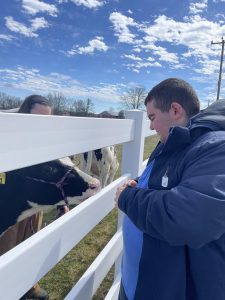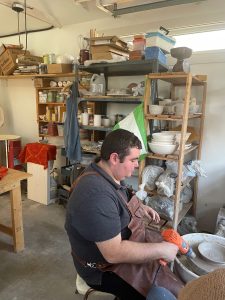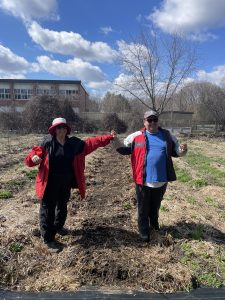Horsebarn Hill is among the learning environments helping a UConn researcher conduct potentially life-changing research for minimally verbal autistic young adults

A view of Horsebarn Hill at sunrise. (Peter Morenus/UConn Photo)
It was early spring, a cool morning on Horsebarn Hill with the sun breaking through the clouds signaling a warmer day ahead. The setting greeted a family who traveled from Toronto with their 23-year-old son Ben, who was focused on the hustle and bustle of cows being fed. Though the animals of Horsebarn Hill are good company, the family traveled here to work with UConn Department of Speech, Language, and Hearing Science Assistant Professor Lindsay Butler, one of the only researchers studying language in minimally verbal adolescents and young adults with autism, like Ben.
The visit took place on the eve of Autism Acceptance Month in April, and Butler notes that though autism is a lifelong neurodevelopmental condition, crucial supports do not follow autistic individuals into adulthood. Butler is working to fill a gap in the research that translates to the therapies and services available to those who need them.
"When I was working as a speech and language pathologist with kids like Ben, I realized there was no research on older children or young adults on the autism spectrum who struggle with language. There is no evidence for how to support them as they transition to adulthood. Even though their language may be quite delayed, we know that language development and learning are lifelong processes," says Butler.
Ben's mother Natalie says that once Ben reached adulthood, not only did affordable educational and care resources end, but she has also been told they simply do not have the tools to help Ben. She quit her job and in trying to find resources, Natalie was thrilled to come across Butler's work, which stood out because of her focus on language development in older children, adolescents, and young adults.
"With a lot of speech and language pathologists or speech therapists, in our experience, once kids have gotten a bit older it is 'game over,' there are no quick results anymore, and they're done," says Natalie. "I found Lindsay and reached out. She is willing to try different ways to engage Ben to figure out what was happening with his language issues."
Natalie reached out in part to "show and tell" about Ben's abilities in environments that are intrinsically motivating to him. She explains that Ben is an intensely social person who loves to bake with his father Gideon, make pottery, volunteer in three different community gardens, and visit his community center gym.

"His favorite thing to do is give people presents and have celebrations," says Natalie. "It doesn't matter what the occasion is as long as we can do something together and we do not need to talk about it."
A careful crafting of community-engaged research
Horsebarn Hill is another important draw to UConn, says Natalie, because of his love of animals.
"They calm him. They accept him. They do not make any verbal demands on him."
The variety in Ben's interests resonated with Butler who says when able to interact naturally in environments where they are comfortable and intrinsically motivated, minimally verbal autistic individuals show significantly better communication and cognitive skills, and research is now starting to show that.
Natalie explains that although Ben knows thousands of words, his language skills range anywhere between those of a one-year-old and a six-year-old, and the hope is that in environments where Ben is relaxed and engaged in exploring, he may be motivated and able to learn more words. Throughout their three-day visit to UConn, Butler planned many activities to engage Ben's interest, including the trip to Horsebarn Hill and a visit to the Department of Kinesiology Assistant Professor Sudha Srinivasan's lab. Butler also planned an Easter party where Ben and Gideon baked special Easter cupcakes and cookies that everyone decorated together. Natalie says the party was the highlight of the visit for Ben.
For Butler, the visit was not only an opportunity to connect with Ben and his parents, but it was also a chance to start planning and designing community-engaged research. While exploring Horsebarn Hill, Butler carefully observed Ben and his interactions with his surroundings.
"I'm a researcher and I carefully craft these studies," Butler says. "Through our observations and discussions, I am thinking about where the research needs to go to be helpful. One of those things is getting the rest of us to understand how we can communicate with people like Ben to engage authentically and to support lifelong learning."
Gideon explains that they know Ben is picking up words or phrases because he is always communicating in his own way.
"For example, when he wants to get out of the pool, we know he's done because he'll say something like 'shorts' which means he wants to get dressed, because these are the next steps. That's effective with us because we understand them, we know the context."
'They understand so much more than most people assume'
Learning how to effectively communicate, and understanding that context for people like Ben, is one of the aspects Butler's lab is addressing. They have developed touch screen response tasks which put few communication and social demands on users. The tasks can also be done remotely, so users can use the platform from the comfort of their own homes, and they can be tailored to each individual. The tasks have about 20 words or short phrases with motivations, like videos, that will appear after the tasks are completed. The videos are also a way to space out the tasks and help the users anticipate what will be happening and when they are done. Communicating what will happen, when they will have a break, and when they will be done is important because it helps reduce anxiety.
"We do things that are intrinsically motivating and can be done in environments where they're comfortable and we're seeing individuals who maybe only say a few words, but with this method, their language comprehension tests through the roof. We are scrambling to develop more complex language comprehension tasks. They understand so much more than most people assume," says Butler.

Ben's inquisitive nature and love of animals were evident as he delighted in watching the awkward galloping of one of Horsebarn Hill's newest residents, a fuzzy and curious foal. Ben described what was happening and what he saw, with words like "foal" and "nurse" as the foal fed.
"He's a happy guy, and because he's hypo-sensory, he likes new environments and stimulation, and he wants to be social. He wants to talk to you, he just doesn't have the language skill set. That's where Lindsey comes in, not to change him, but to help him," says Gideon. "If you're going to have someone who's got a huge wall with language, how do you get someone to want to even try and create a sentence and learn things if you're going to be in a boring environment? That's why we came here."
Gideon explains that a lot of the inability to produce spoken language is due to language impairments, and he describes Ben as having no off-ramp from the language highway.
"Whatever method we try, the words are just not coming out," Gideon says. "But he is very visual, and we get glimpses into what he is processing. Several years ago, we were in Montreal around Christmas, and he wanted to go to a drive-through zoo just outside of Montreal, but it was closed for the season, and we explained this to him. Ben went to the computer in the other room, and about 15 minutes later, he came back to us and said 'Park Omega,' and we didn't know what he meant. He showed us that he found a drive-thru zoo not far from Montreal with all Canadian animals open year-round. He had processed all the necessary bits of input and he found something that we had never heard of, and we grew up there. The zoo he found met all the criteria that we had just explained to him that were not met by the other zoo, he took that in and processed it, but it wasn't going to come back out as language."
With Butler, Natalie and Gideon are hoping to develop tools to help the words come out because they are tired of being told by educators that there are no tools available or that Ben is unteachable. During the COVID-19 lockdown, Ben proved them wrong. Natalie says together they created and recorded two yoga routines where Ben led the way and explained what he was doing.
"The recordings made the rounds in the school district, and they said, 'We had no idea he could do this. He is teachable,'" Natalie says. "Meanwhile, we know otherwise. He loves Dali, he makes pottery that people want to buy, and he bakes great stuff. But they look at him and don't think he is teachable."
On the last day, Butler invited some of her students to have lunch with Ben and have a conversation about their favorite things. Butler created a slide deck that included things that Ben loves to spark conversation, says Natalie.

"Because Lindsay took the time to develop a connection, Ben was willing to do work that was very difficult for him - language exercises and research," Natalie says. "The students and Ben asked each other 'What is your favorite ___'. After that, we did several tests where Ben scored perfectly on nouns, adjective nouns, and short sentence comprehension, but when he was tested on plurals, he did not manage at all. This made us realize that there is so much more to find out about Ben. We want him to live a healthy life. That is what most parents hope for their children. This requires communication skills! This is a long journey that special researchers and clinicians like Lindsay will help us get closer to this objective."
For people like Ben and his parents, and many others facing the same gaps in care and education, Butler's research could be life changing.
"For the 25-30% of non or minimally verbal autistic young adults, years of standardized assessments have told them, their families, and their educators that their cognitive and communication abilities are below the first percentile, with an age-equivalent of 18-36 months, and that they are profoundly cognitively impaired," says Butler. "Even more damaging, these scores are often used to broadly deny them opportunities without consideration of individual skills and strengths. Research now shows that when non or minimally verbal individuals' skills are evaluated in naturalistic and motivating contexts, they, in fact, show many of the cognitive and language skills that standardized assessments attempt to measure. The goal of my lab's research is to broaden these naturalistic and flexible approaches to identify strengths and the brain mechanisms that support them. This kind of approach is necessary to enhance the health and well-being of non/minimally verbal young adults and their families throughout the lifespan."






